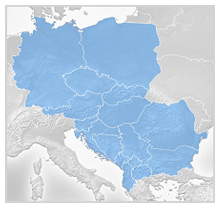Declarations
7th ZEVA Symposium
Český Krumlov, Czech Republic, 27 May 2000
hosted by the Czech Medical Chamber
Memorandum of
Cesky Krumlov
on
Public Functions and Professional Representation
by Chambers of Physicians (and Dentists)
The tasks of the Chambers of Physicians are directed to two sides: For the general public they are a guarantee for high standards of medicine and the ethical provision of medical services by doctors. For the community of doctors they are the democratic representation towards society, administration and politics.
Chambers are incorporated by laws as statutory bodies.
The purposes of statutory bodies are
- to carry to a limited extent sovereign rights
and
- to decentralise and to regionalise state power and administrative tasks.
As statutory bodies have mainly public functions, compulsory membership is necessary.
The laws on chambers require a democratic structure of the chamber and determine the organs and basic procedures.
With these laws the state parliaments delegate public functions to the self-government of physicians:
- the development of a professional code and the supervision of the profession. In most chambers the professional code is based on the Hippocratic oath and the World Medical Association Declaration of Geneva. Chambers take disciplinary actions on those members who fail.
- regulation and supervision of postgraduate education. The regulation of the postgraduate training of doctors is seen as a common task of all doctors. This is to eliminate particular interests and refocus on patients' interest and scientific necessities. Examinations are held by the chambers which also certify the teachers. The chamber certifies the successfull completion of the postgraduate training.
- continuing medical education. Chambers offer Continuing Medical Education (CME) -courses and evaluate courses by other organisations. They have institutions for CME and usually a journal that serves as a medium for continuing medical education.
- quality assurance. The strongest instruments to foster quality are measures of structural quality assurance as there are: specialisation, CME, particular training and cooperation. Physicians have to participate in QA-measures that chambers have introduced.
- ambulatory emergency service. Chambers can organise an ambulatory emergency service. In a region, town or suburb there must always be a doctor on call outside office hours. The emergency service is handled differently in metropolitan and rural areas with doctors either being on shift in special emergency rooms or going on house visits. This system is not to be mixed up with the rescue system which has to be organised by the municipalities.
- arbitration. The chambers have installed boards on which doctors and lawyers take care of patients' complaints by hearings and recommendations. The call on the board and the participation in hearings is voluntary for patients as well as for doctors. The chambers also arbitrate between doctors.
- the licensing of doctors to practice medicine (to various degrees), their registration, and the revocation of license. Licensing should be done by the chamber, which also registers doctors. In case of severe professional or criminal misconduct or in case of mental of physical disabilities, which are not compatible with the professional work, the chamber has the right to revoke the license.
- defending economic interests. Chambers are partners for hospitals and other institutions employing doctors, health insurance and social health insurance funds, unions, and governments in negotiating salaries, tariffs, and working conditions.
- cooperation with the public health service. When the public health service needs the cooperation of other physicians, the chamber will provide the necessary support. This is especially the case in the field of medical statistics and its analysis.
Nevertheless, the chambers are independent of the government and only supervised for their obedience of the law. All medical and professional questions are dealt with in self-governmental processes.
However, in the political field chambers are most visible because of their representational task:
- representation in politics and media. The elected chamber officers represent the whole community of doctors and are mandated to present the opinion of the physicians towards politicians and the media. However, this mandate is limited to medical and social issues.
- statements on draft laws and other regulations. As far as they concern or affect medical or social issues the chamber must be able to give statements, comments and criticism on draft laws and other regulations.
- expert opinions. The chamber or delegated members will give expert opinions, provide experts in court or parliamentary hearings.
- publication of a press organ. All chambers should have newsletters and/or journals that are published regularly.
Finally the chambers have social tasks:
- pension scheme. Doctors should have their own retirement insurance, which provides a fairly better coverage than the general retirement insurance since it is tailored to the needs of the medical profession.
- welfare. Chambers pay welfare to those members in need.
